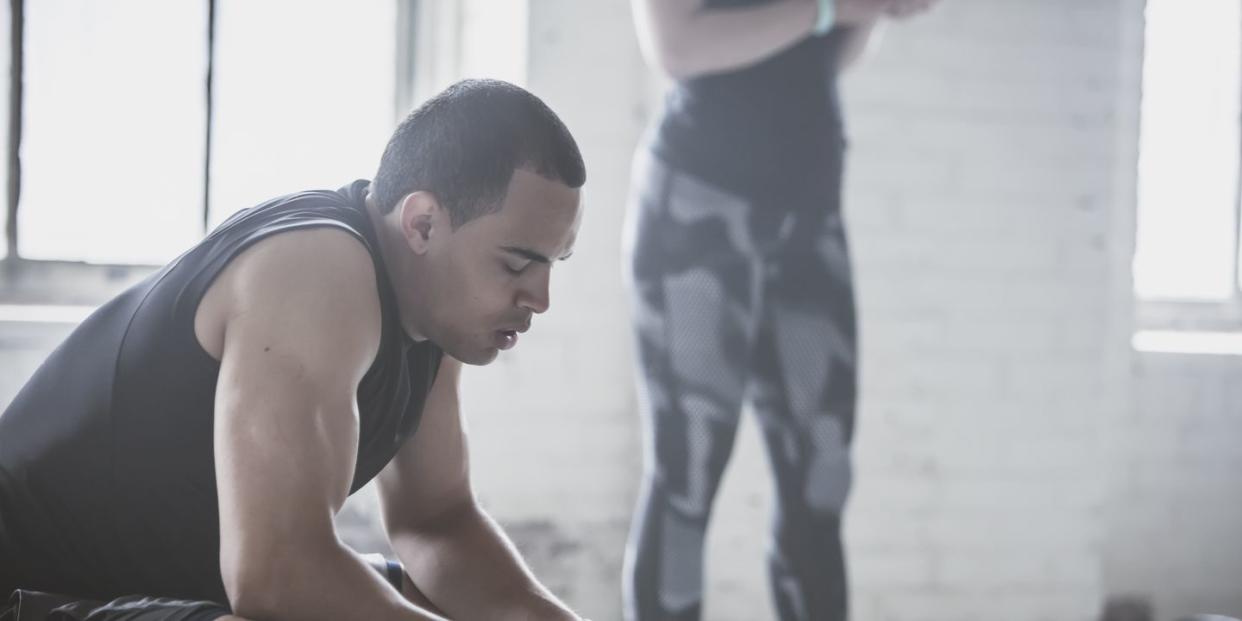5 Signs You're Losing Muscle Instead of Fat

Losing weight is hard. From the diet changes to the ramped-up workouts, it can take a serious overhaul of your lifestyle. And usually, the goal is to decrease body fat and increase muscle. But sometimes in that quest, you can start to lose muscle instead of fat—and that's not a great scenario.
"It is bad to lose muscle instead of fat, because muscles are the key players in body movement and function," says Gerardo Miranda-Comas, MD, Assistant Professor of Rehabilitation Medicine, Icahn School of Medicine at Mount Sinai. "With loss of muscle mass, strength and endurance are affected negatively, leading to decreased functional performance."
But your body shouldn't naturally go for muscle first in weight loss—if you're doing it right.
"In general, muscle is not lost before fat—it is very dependent on nutrition and activity volume," Miranda-Comas says. "A person who is attempting to lose weight by not eating may lose weight in muscle first before fat."
How does that happen? Well, the body likes to go for carbs (glucose) for energy first. If that's not available, it goes for glycogen, which is glucose that's been stored in the liver and muscles, says Dr. Miranda-Comas.
"Fat is also used for energy depending on duration of the physical activity, and an individual can train their body to use fat as the primary source of energy," says Dr. Miranda-Comas. (Hello, ketosis—the basis of the keto diet.)
"A healthy diet is usually 45-65% carbs, anywhere from 15-35% protein, and 20-35% fat," says Wesley Delbridge, RDN, spokesperson for the Academy of Nutrition and Dietetics. "The point is having a balanced diet and not restricting any food very low."
This, of course, depends on the diet you're following. Some may be low-carb (like the keto diet), high-protein (like the Atkins diet), or low fat. But if you're taking it to extremes, your body will start to feel it.
But how can you tell if you're losing muscles and not fat? Here are 5 signs.

1. Your workout feels more strained.
It may seem kind of obvious, but your workouts might feel harder--and you may feel like skipping it altogether.
"You’ll notice less strength in the gym. The weight you used to be able to do for reps may decrease or you may not be able to get as many reps as you once did for each set," says Spencer Nadolsky, D.O., author of The Fat Loss Prescription.
2. You feel sluggish doing everyday activities.
You won't just feel muscle loss it in the gym.
"Inadequate nutrition can lead to a decrease in muscle, which may lead to impaired function," says Dr. Miranda-Comas. "This is usually caused by an energy deficiency and possible overtraining."
"In the very active individual who is losing weight along with a decrease in performance, we must consider overtraining," says Dr. Miranda-Comas.
3. Your body fat percentage isn't budging.
If you're losing weight but your body fat percentage is staying the same, it's probably a sign you're losing muscle.
"Your body won’t shape the way you want. You’ll notice shrinking circumferences, but the pinch-able fat is the same," says Dr. Nadolsky.
4. You're losing weight at a rapid pace.
While you may be pumped at seeing those numbers, it's probably not good news for your muscle mass—unless you have a lot of fat to lose to start.
"The more fat you have, the more likely you'll lose more fat than muscle when losing weight," says Dr. Nadolsky.
Losing weight rapidly is usually not sustainable, either.
"Weight loss requires a long period of time and being patient—it's a marathon and not a sprint. People should (only) lose 1-2 pounds per week," says Delbridge.
For tips from real guys who lost significant amounts of weight, check out our list of the year's most jaw-dropping weight loss transformations.
5. Your workout never progresses
It goes without saying that it's hard to push yourself when you're tired. If you can never go up in weight when lifting that might be another sign you've lost muscle, according to Albert Matheny, C.S.C.S, R.D., founder of Soho Strength Lab. “A lot of factors affect performance, but not seeing progress in training is a good sign you’re not hitting your body’s needs,” he told Women's Health.
You Might Also Like

